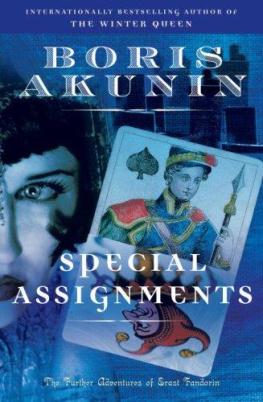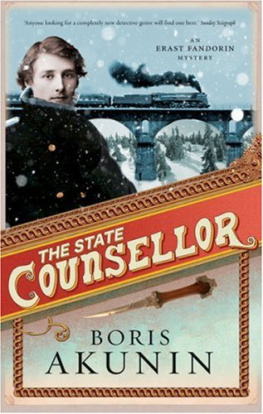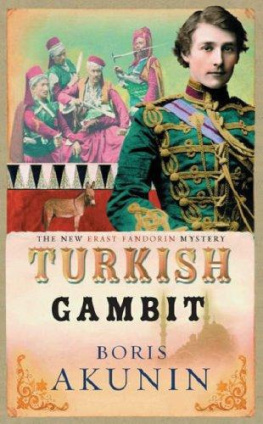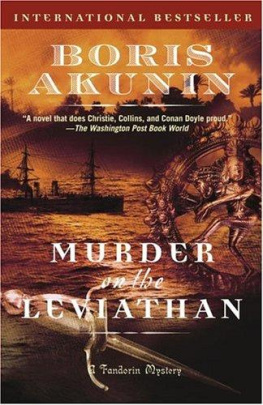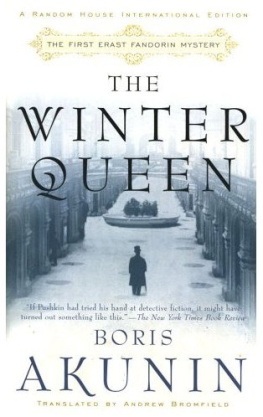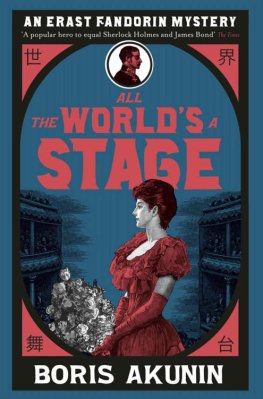The Death of Achilles
(The fourth book in the Erast Fandorin series)
by Boris Akunin
2005
International intrigue, professional rivalry, the criminal underworld of nineteenth-century Moscow, and an irresistible femme fatale: if Erast Fandorin was hoping for a quiet homecoming, he is about to be disappointed. Erast Fandorin returns to Moscow after an absence of six years, only to find himself instantly embroiled in court politics and scandal. His old friend General Sobolev the famous Russian Achilles has been found dead in a hotel room, and Fandorin suspects foul play. Using his now-famous powers of detection powers that belie his twenty-six years Fandorin embarks on an investigation, during which the political and the personal may become dangerously blurred. With the assistance of some formidable martial arts skills, acquired whilst Fandorin was in Japan, our eccentric and ingenious hero must endeavour to discover not so much whodunit, as why
ONE
In which the links of coincidence are forged into the chain of fate
The morning train from St. Petersburg, still enveloped in the swirling smoke from its locomotive, had scarcely slowed to a halt at the platform of Nikolaevsky Station, and the conductors had only just unfolded the short flights of steps and tipped their peaked caps in salute, when a young man attired in quite remarkable style leapt out of one of the first-class carriages. He seemed to have sprung straight out of some picture in a Parisian magazine devoted to the glories of the 1882 summer-season fashion: a light suit of sandy-colored wild silk, a wide- brimmed hat of Italian straw, shoes with pointed toes, white spats with silver press-studs, and in his hand an elegant walking cane with a knob that was also silver. However, it was not so much the passengers foppish attire that attracted attention as his physique, which was quite imposing, one might almost say spectacular. The young man was tall, with a trim figure and wide shoulders. He regarded the world through clear blue eyes, and his slim mustache with curled ends sat quite extraordinarily well with his regular features, which included one distinctive peculiarity the neatly combed black hair shaded intriguingly into silver-gray at the temples.
The porters made short work of unloading the young mans luggage, which is itself worthy of special mention. In addition to suitcases and traveling bags, they carried out onto the platform a folding tricycle, a set of gymnastic weights, and bundles of books in various languages. Last of all there emerged from the carriage a short, bandy-legged oriental gentleman with a compact physique and an extremely solemn face and fat cheeks. He was dressed in green livery, combined discordantly with wooden sandals and a gaudy paper fan hanging around his neck on a silk string. This squat individual was clutching a quadrangular lacquered box in which was growing a tiny pine tree, looking for all the world as though it had been transported to the Moscow railway station from the kingdom of Lilliput.
Running his eye over the distinctly uninspiring structures of the railway terminus with a curious air of excitement, the young man inhaled the sooty station air and whispered: My God, six long years. However, he was not permitted to indulge his reverie for long. The passengers from the St. Petersburg train were already being waylaid by cabbies, most of whom were attached to Moscows various hotels. Battle was joined for the handsome dark-haired gentleman, who appeared to be a most desirable client, by knights of the road from the four hotels regarded as the most chic in Russias old capital the Metropole, the Loskutnaya, the Dresden, and the Dusseaux.
Come stay at the Metropole, sir! the first cabbie exclaimed. An absolutely modern hotel in the genuine European style! And the suite has a special box room for your Chinee here!
He is not Chinese, but J-Japanese, the young man explained, incidentally revealing that he spoke with a slight stammer. And I would prefer him to lodge with me.
Then Your Honor should come to us at the Loskutnaya, said the next cabbie, shouldering his competitor aside. If you take a suite for five rubles or more, we drive you for free. Ill get you there quick as a wink!
I stayed in the Loskutnaya once, the young man declared. Its a good hotel.
What would you want with that old antheap, Your Honor, said a third cabbie, joining the fray. Our Dresdens a perfect haven of peace and quiet, so elegant, too and the windows look out on Tverskaya Street, straight at His Excellency the governors house.
The passenger pricked up his ears at that.
Indeed? That is most convenient. You see, it just happens that I shall be working for His Excellency. I think perhaps
Hey there, Your Honor! shouted the last of the cabbies, a young dandy in a crimson waistcoat, with hair parted and brilliantined so painstakingly that it gleamed like a mirror. All the best writers have stayed at the Dusseaux Dostoevsky, and Count Tolstoy, even Mr. Krestovsky himself.
This psychologist of the hotel trade had spotted the bundles of books and chosen his subterfuge well. The handsome, dark-haired young man gasped.
Even Count Tolstoy?
Why, of course, His Excellency comes straight around to us first thing, the moment he reaches Moscow. The crimson cabbie had already picked up two suitcases. He barked briskly at the Japanese: You carry, walky-walky, follow me!
Very well, then, the Dusseaux it shall be, said the young man with a shrug, unaware that this decision would become the first link in the fatal chain of subsequent events.
Ah, Masa, how Moscow has changed, the handsome passenger repeated again and again in Japanese, as he constantly twisted around on the leather seat of the droshky. I can barely recognize it. The road is completely paved with cobblestones, not like Tokyo. And how many clean people there are! Look, theres a horse-drawn tram; it follows a fixed route. Why, and theres a lady upstairs, in the imperial! They never used to allow ladies upstairs. Out of a sense of decency.
Why, master? asked Masa, whose full name was Masahiro Sibata.
Why, naturally, so that no one on the lower level can peep while a lady is climbing the steps.
European foolishness and barbarism, said the servant with a shrug. And I have something to say to you, master. As soon as we arrive at the inn, we need to summon a courtesan for you straight away, and she must be first-class, too. Third-class will do for me. The women are good here. Tall and fat. Much better than Japanese women.
Will you stop your nonsense! the young man said angrily. Its revolting.
The Japanese shook his head disapprovingly.
How long can you carry on pining for Midori-san? Sighing over a woman you will never see again is pointless.
Nonetheless, his master did sigh again, and then yet again, after which, clearly seeking distraction from his melancholy thoughts, he turned to the cabbie (they were driving past the Strastnoi Monastery at the time) and asked: Whose statue is that theyve put up on the boulevard? Not Lord Byron, surely?
Its Pushkin, Alexander Sergeevich Pushkin, the driver said reproachfully, turning around as he spoke. The young man blushed and began jabbering away to his short, slanty-eyed companion again in that strange foreign language. The only word the cabbie could make out was Pusikin, repeated three times.
The hotel Dusseaux was maintained after the manner of the very finest Parisian hotels with a liveried doorman at the main entrance, a spacious vestibule with azaleas and magnolias growing in tubs, and its own restaurant. The passenger from the St. Petersburg train took a good six-ruble suite with windows overlooking Theater Lane, signed the register as Collegiate Assessor Erast Petrovich Fandorin, and walked over inquisitively to the large blackboard on which the names of the hotels guests were written in chalk, in the European fashion.


